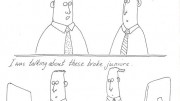The esoteric world of monetary history turned a page on Feb. 1, 2006, with the swearing in of Ben Bernanke as the new chairman of the Board of Governors of the United States Federal Reserve, or “the Fed.”
Bernanke is taking over after the 18-year reign of Alan Greenspan, who will be forever remembered for his pithy phrase “irrational exuberance,” used to describe the early days of the Internet-stock bubble.
Greenspan gained worldwide fame by presiding over the Fed during some critical moments, including the market crash of October 1987, the Asian financial crisis in the late-1990s, the Internet mania and the attacks of September 11, 2001.
For gold bugs, Greenspan will be remembered with some anguish as a man who, in his younger days as an Ayn Rand groupie, believed in the gold standard and its singular ability to protect savings from confiscation through inflation. However, Greenspan quickly shelved those beliefs when real monetary power came into his hands.
We’re all familiar with Greenspan and his legacy, but who is Ben Bernanke, and where will he lead the Fed?
Well, for starters, he’s a 52-year-old, genial brainiac economist and a father of two children with his wife Anna, a former Spanish teacher at Princeton University.
Prior to his involvement with the U.S. government, Bernanke had a stellar career as an academic economist, and showed promise early on. Born in Georgia and raised in the southeastern U.S., Bernanke scored a 1590 out of 1600 on his SAT university entrance exams.
He earned a BA in economics at Harvard and a PhD in economics from the Massachusetts Institute of Technology. After graduating in 1979, he taught economics at Stanford University and Princeton, where he became department chairman, until 2002. As a professor, he had a special interest in the Great Depression and the period’s substantial monetary deflation.
From 2002 until mid-2005, Bernanke served as a member of the Board of Governors of the Federal Reserve, after which he became chairman of the U.S. President’s Council of Economic Advisers (CEA).
As Fed chairman, probably the biggest difference between Bernanke and his predecessor will simply be one of style: Bernanke has said he wants the Fed to be more transparent and quantitative in its pronouncements. (Greenspan once dryly joked, “I guess I should warn you, if I turn out to be particularly clear, you’ve probably misunderstood what I’ve said.”)
In particular, Bernanke is likely to emphasize the consensus forecast of the Federal Open Market Committee members — a group Greenspan often avoided mentioning altogether.
We expect to see a deep commitment from Bernanke to price stability through the targeting of “core” inflation at 1-2% per year, and foresee no imminent change to the Fed’s slow but relentless tightening of the federal funds rate we’ve witnessed in recent years.
With respect to gold, Bernanke tellingly says it’s one indicator he’ll use to gauge inflation pressures, and has even subtly suggested that U.S. monetary policy would be improved if the dollar was defined in terms of gold or a basket of commodities.
Bernanke has also vowed to avoid “making recommendations on specific tax and spending proposals,” but as Greenspan showed with his support of president George W. Bush’s reckless tax cuts, the temptation to do so may prove irresistible with time.
Greenspan, meanwhile, is managing to cope with his loss of power. He’s now charging US$100,000 to give a single speech and, with lawyer Robert Burnett acting as literary agent, has stoked a bidding war for his memoirs, with the latest highest-bid figure rumoured to be in the low millions. Burnett last assisted Hillary and Bill Clinton secure book deals worth US$8 million and US$12 million, respectively. Who says public service doesn’t pay?



Be the first to comment on "Editorial: Bernanke era begins at the Fed"